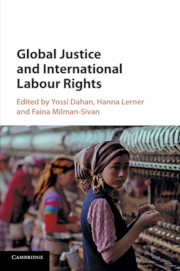Book contents
- Global Justice and International Labour Rights
- Global Justice and International Labour Rights
- Copyright page
- Contents
- Book part
- Contributors
- 1 Introduction
- Part I Justice in a global labour market: philosophical foundations
- Part II International labour law as a sphere of justice
- Part III Global governance, democracy and international labor
- Index
- References
Part I - Justice in a global labour market: philosophical foundations
Published online by Cambridge University Press: 05 May 2016
- Global Justice and International Labour Rights
- Global Justice and International Labour Rights
- Copyright page
- Contents
- Book part
- Contributors
- 1 Introduction
- Part I Justice in a global labour market: philosophical foundations
- Part II International labour law as a sphere of justice
- Part III Global governance, democracy and international labor
- Index
- References
- Type
- Chapter
- Information
- Global Justice and International Labour Rights , pp. 25 - 118Publisher: Cambridge University PressPrint publication year: 2016



